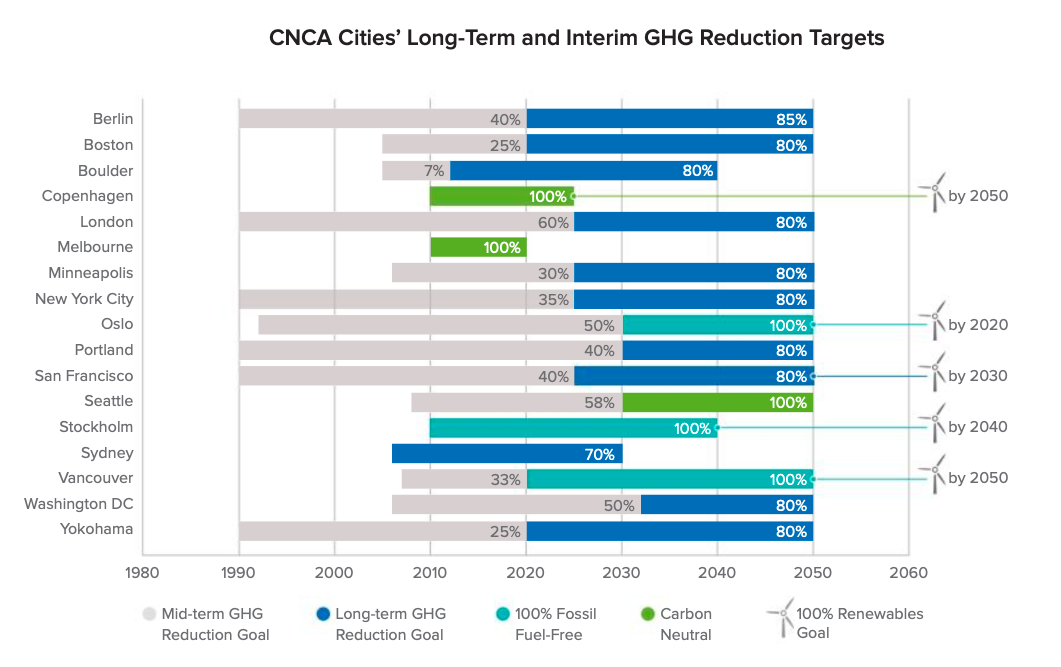Cities inhabit more than half the world population and contributes to three quarters of total carbon emissions. To avoid the worst impacts of climate change, greenhouse gas (GHG) emissions must be cut down by at least 80% by the end of the century. To tackle the problem of global warming, and aggressively work towards zero-carbon future, in June 2014 in Copenhagen, major global cities came together to form an alliance to achieve carbon neutrality by 2050.
Who They Are:
CNCA – Carbon Neutral Cities Alliance – is a collaboration between 20 leading cities across globe (including Vancouver, as shown in the figure above), to combat global warming by aggressively cutting down their carbon emissions; with the target to attain 80-100% reduction by mid-century or sooner. The aim is to work together and find innovative solutions to offset the carbon emissions by the cities and set a standards & guidelines for other cities to follow.
What They Do:
The five main working principles of CNCA are:
- Developing Carbon Neutrality Planning and Implementation Standards: The principle promotes the idea of developing innovative ideas and approaches to support carbon neutrality, by standardizing measurements and verifying methods for tracking purposes.
- Supporting Deep Decarbonization Innovations: Investing in city-wide projects to develop, test, implement & amplify deep decarbonization practices and ideas.
- Advancing Transformative Change in Key Urban Sectors: Sharing and implementing best practices amongst each other, in the field of transportation, energy use and waste systems, to accomplish the deep decarbonization in the cities.
- Speaking with a Common Voice: The alliance deems important to have a common voice in all local and international platforms and advocate for policies at different levels of government in order to reduce emission sources not controlled directly by cities and engage with other stakeholders that are important for the success.
- Advancing a “Next Wave” of Carbon Neutral Cities: Providing a benchmark for other cities to follow and attain carbon neutrality is the most important principle of the alliance. They aim at creating innovative solutions and methodologies as standards that can be used as a guideline in future.
Each city in the alliance has individual goals, but all of them are committed to achieving at least 80% carbon neutrality by 2050. The figure below shows the targets of each city and their timeline for the same.
What They Have Achieved (So Far):
To date, the Alliance has invested $2.4 million in 27 early-stage innovation projects targeting transportation, energy-supply, buildings, and waste systems. Cities are moving forward and increasing their economy while simultaneously reducing carbon emissions. The table below gives an update on the performance of 16 of the 20 cities till date.
| Baseline Year | Emissions Reduction | Economic Growth | |
| Adelaide | 2006 | 15% | 35% |
| Berlin | 1990 | 32% | 32% |
| Boston | 2005 | 13% | 20% |
| Boulder | 2005 | 16% | 57% |
| Copenhagen | 2005 | 42% | 24% |
| Melbourne | 2006 | 3% | 42% |
| Minneapolis | 2006 | 18% | 30% |
| New York City | 2005 | 14% | 23% |
| Portland | 1990 | 21% | 24% |
| San Francisco | 1990 | 30% | 110% |
| Seattle | 2008 | 6% | 22% |
| Stockholm | 2005 | 25% | 37% |
| Sydney | 2006 | 19% | 37% |
| Toronto | 1990 | 24% | 36% |
| Vancouver | 2006 | 11% | 26% |
| Washington DC | 2008 | 24% | 14% |
Why Are They Important:
Avoiding the most destructive effects of climate change requires reimagining and reinventing urban centers to put them on the path of zero carbon future. CNCA is designed as a space for cities to work together in practical & mutually beneficial ways to address challenges faced to achieve decarbonization. By sharing resources and collaborating, they are trying to accelerate the progress in meeting their individual goals, have consistency in planning across nations, and inspire other cities to attain similarly aggressive goals by setting baseline standards for them to follow.
References:
Cygler, C. (2017), For Carbon Neutral Cities, LeLab Ouisharex C:ronos. Report for a LeLab Member.
USDN, https://www.usdn.org/public/page/13/CNCA
Carbon Neutral Cities Alliance, https://carbonneutralcities.org/
CNCA, http://climateinitiativesplatform.org/index.php/Carbon_Neutral_Cities_Alliance
Carbon Neutral Cities Alliance – Framework Report


